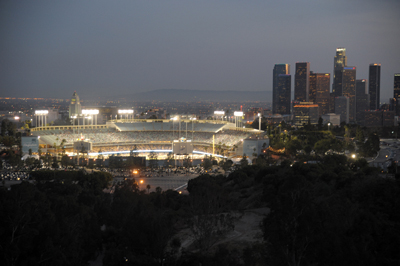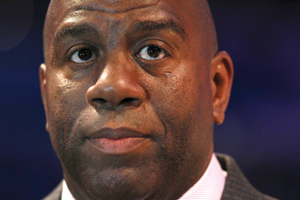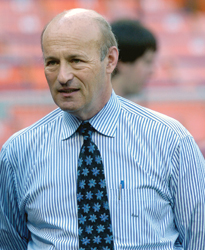Even Stan Kasten, presumptive president and chief executive of the Los Angeles Dodgers, was trying to come to grips with the mammoth scope of the $2.15 billion agreement to buy the historic team from Frank McCourt.
“Given the very recent and significant escalation in franchise prices, I’m very glad this is the last sports team I’m ever going to buy,” Kasten quipped.
 |
Developing the land surrounding Dodger Stadium has potential to boost revenue for the new team owners.
Photo by: NEWSCOM |
Within Kasten’s offhand comment, however, lies the fundamental question of the landmark deal he and the rest of Guggenheim Baseball Management struck to buy the
Dodgers: How does this acquisition make any sort of financial sense?
The deal’s size is nearly twice the prior record for a North American sports team sale, Stephen Ross’ $1.1 billion purchase of the Miami Dolphins in 2009, and nearly three times the $845 million the Ricketts family paid for the Chicago Cubs the same year. Guggenheim, as part of the overall deal, committed $150 million to enter into a joint venture with McCourt for the Dodger Stadium parking lots and related Chavez Ravine land.
A vital part of the Dodgers’ financial future is the club’s cable TV rights, which will hit the open market beginning with the 2014 season. A fierce battle involving Fox Sports Net, Time Warner and probably other major suitors is likely to push the rights fees beyond $4 billion covering a 20-year period, according to estimates from several media executives. The coming negotiations could also yield a new regional sports network in which the Dodgers would hold equity. In either scenario, the Dodgers and the Los Angeles media market that is the country’s second largest are the focal point of a historic escalation in local rights fees now enveloping much of baseball.
“The buyers here now sit in absolutely ideal position of leverage with regard to the media rights,” said Chuck Greenberg, former Texas Rangers managing partner and current chairman and managing partner of the Class A Myrtle Beach (S.C.) Pelicans.
Other significant opportunities await the team for boosting revenue in and around 50-year-old Dodger Stadium, which underwent a series of renovations under McCourt but probably needs at least $200 million in additional work, according to several executives that were involved in the bidding for the club. The surrounding 250 acres, located less than three miles from downtown Los Angeles, also holds vast potential given the continued growth of the center city area. But with difficult access points, the property is no guaranteed goldmine.
“I’ve always been skeptical of the idea of developing retail and entertainment in the parking lots. It just doesn’t seem like the right location,” said sports architect and Los Angeles-area resident Don Meis. “It isn’t easily visible or accessed and would seem to be a challenging location on non-game days.”
Given the unprecedented size and complexity of the deal, it may take years, maybe decades, before it is fully realized and understood. “It’s going to be a long time before anyone really knows if they paid the right price, overpaid, or got a great deal,” said Steve Tisch, New York Giants co-owner. “It’s a unique situation and a very iconic brand. … But it’s a big number.”
Added Chicago-based sports consultant Marc Ganis, “This number is simply too high for today’s industry, today’s situation, even in the most optimistic of circumstances. Maybe in five or 10 years it begins to make more sense along those lines. There was a huge deal premium involved here, one that now presents the need for an extraordinary business plan that is executed flawlessly.”
The Dodgers generated about $240 million in revenue last year, down sharply from $265 million in 2010 and $286 million in 2009. Team sales often occur at a multiple of about three times annual revenue, though there often are variations depending on particular circumstances. The Dodgers, however, just sold at a multiple of more than eight times annual revenue.
 |
Magic Johnson may hold a smaller equity stake, but he gives the Dodgers an outgoing brand advocate.
Photo by: GETTY IMAGES
|
Kasten and Guggenheim, for their part, are trying to view the deal beyond strictly return-on-investment terms. Joining Kasten in the deal are Mark Walter, chief executive of Chicago financial services firm Guggenheim Partners; basketball hall of famer and businessman Magic Johnson; Mandalay Entertainment Group Chairman Peter Guber; and a group of other investors. Walter will be the chairman, lead owner and designated control partner for the
Dodgers, while Johnson, Kasten, and the other investors will carry far smaller equity stakes.
“Our interest here, clearly, is to transcend ROI,” Kasten said. “In a certain sense, the purchase price only matters if you’re looking to flip this, and with us, this is something we’re looking to hold on to literally for generations. This is such a unique property and a Tiffany brand.”
That mind-set governed the frenetic 48 hours last week in which the Guggenheim group pre-empted an auction set to be held Wednesday in New York with the final three bidding groups, which also included hedge fund billionaire Steven Cohen and Kroenke Sports Enterprises owner Stan Kroenke. The last Guggenheim bid submitted to McCourt before the auction was so much higher than the rival offers that McCourt essentially pulled the team off the block at that point. In fact, the roughly $650 million gap between Guggenheim’s bid and those from Cohen and Kroenke was about equal to what Jim Crane paid less than five months ago for the Houston Astros, a team with a seemingly bright financial future of its own based on a coming regional sports network and a 12-year-old ballpark in fine shape.
“We have now seen true free agency in the pursuit of a major franchise,” said baseball agent Scott Boras, referencing in part some other team deals where MLB exerted more control over the sales process.
“Way back when, when the [Boston] Red Sox were sold, they necessarily didn’t go to the highest bidder. When the Oakland A’s were sold, they didn’t necessarily go to the highest bidder. We are seeing the evaluation of a franchise in the current market, and I think it is going to be reflected in franchise values to come,” Boras said.
 |
Said Stan Kasten, “The big thing right away is getting the Dodgers operating at maximum productivity levels.”
Photo by: GETTY IMAGES
|
Kasten’s initial step toward rebuilding the
Dodgers and boosting revenue to make the purchase price more economically justifiable will be re-establishing the team’s core business. Attendance, as recently as 2009 the best in MLB, plummeted nearly 18 percent last season to its lowest level in 11 years. Sponsorship, merchandise sales, parking, concessions and other team-specific revenue all suffered as well, as legions of fans, even those holding paid tickets, aggressively avoided Dodger Stadium amid McCourt’s high-profile divorce and bankruptcy woes.
In rebuilding, Kasten will lean significantly on his many years of experience running the Atlanta Braves, Hawks and Thrashers, and then the Washington Nationals. The Braves and Nationals are held in high regard around baseball and still have front office staffs largely built by Kasten during his tenures there.
“The big thing right away is getting the Dodgers operating at maximum productivity levels,” Kasten said. “The primary Dodger business remains the center of everything. Once those core areas are more fully developed, we can then start to think about other brand extensions. And there’s obviously a world of opportunities for us there.”
In developing those brand extensions, the Red Sox may be an important influence on the Guggenheim group. Fenway Sports Group and Guggenheim Baseball Management are structured somewhat similarly, with Walter to serve for the Dodgers in a John Henry-type role leading the organization as a lower-profile numbers guy, Johnson comparable to Tom Werner as a more outgoing brand advocate, and Kasten running day-to-day operations and holding some equity as Larry Lucchino does in Boston. Though the equity split between Johnson and Walter is believed to be far different from what exists between Henry and Werner, Fenway Sports Group’s powerful entries into soccer, auto racing, events, sponsorship sales and other non-baseball activities present a notable example for what could occur in Los Angeles.
“Right now, it’s very much one step at a time, and so much of the energy to date has been focused on simply the deal,” said Irwin Raij, partner with Foley & Lardner, which represented Guggenheim and also was involved with the Cubs and Rangers sales. “But over time, I think you’ll see the group think very creatively about what’s best for the brand.”
Staff writers Daniel Kaplan, Liz Mullen and Don Muret contributed to this report.
| HOW THE DODGERS DEAL COMPARES |
| Team (year) |
Cost |
Principal buyer(s) |
Seller |
| Houston Astros (2011) |
$615 million |
Jim Crane |
Drayton McLane |
| Texas Rangers (2010) |
$593 million |
Chuck Greenberg and Nolan Ryan |
Tom Hicks (at auction) |
| Chicago Cubs (2009) |
$845 million |
Ricketts family |
The Tribune Co. |
|
| Atlanta Braves (2007) |
$461 million |
Liberty Media Corp. |
Time Warner Inc. |
| Washington Nationals (2006) |
$450 million |
Ted Lerner |
Major League Baseball |
| Team (year) |
Cost |
Principal buyer(s) |
Seller |
| Miami Dolphins (2009) |
$1.1
billion |
Stephen Ross |
Wayne Huizenga |
| Chicago Cubs (2009) |
$845 million |
Ricketts family |
The Tribune Co. |
| Washington Redskins (1999) |
$800 million |
Daniel Snyder |
Estate of Jack Kent Cooke |
| Boston Red Sox (2002) |
$700 million |
John Henry |
JRY Trust |
| New York Jets (2000) |
$635 million |
Robert Wood Johnson |
Estate of Leon Hess |
* Among U.S.-based franchises
Note: Deals listed include different additional assets within each sale, such as stadiums or television rights.
Compiled by David Broughton
Source: SportsBusiness Journal archives |






